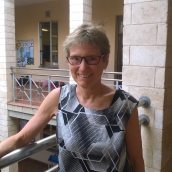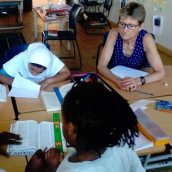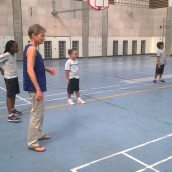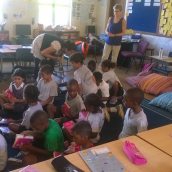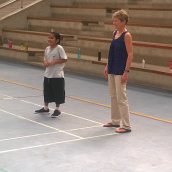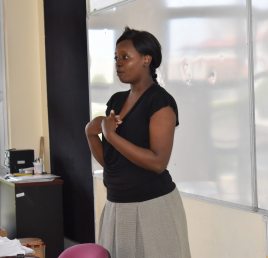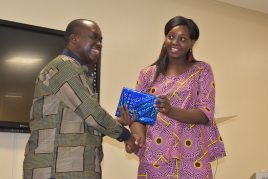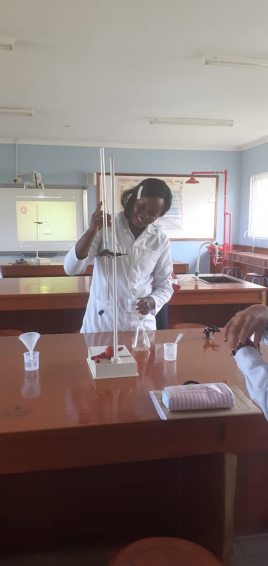Swimming Gala
JS has organised a Swimming Gala on 31 March. For more details, please contact the school's secretaries.
Junior School Sports Day
Junior School will be hosting a Sports Day on 12 May. For more details, please contact the Junior School secretary.
Junior and Senior School Conferences
Junior and Senior School will be held on 5-6 June and 8 June, respectively. For more information, please contact the school secretaries.
Closing of the Extracurricular activities
Extracurricular activities will close on 3rd May, for the 2023-2024 Academic year. School timings will be followed as per regular schedule.
Student led conferences
Student led conferences are scheduled for 13 and 14 June. For more details, please contact Junior and Senior School secretaries.
Spirit Week
From 2-6 September 2024, Senior School students will be celebrating "Spirit Week". For more information, please check Managebac.
Christine Robertson: From Canada to Kenya
Christine Robertson is a veteran Ontario teacher who began a secondment to the Aga Khan Academy (AKA) Mombasa in April 2016. She talks about her experience of coming to Kenya and her first days of getting to know the Academy.
I have been involved in teaching and research, in a variety of capacities, since 1989. I always consider myself fortunate to be an educator. Each day brings something new to my experience and every student interaction is fresh and different. I have taught primarily with students in grades 4, 5, and 6; we refer to these as the junior grades in Ontario. I have also been involved in outdoor education and have taught some teacher preparation courses in classroom management. My research has included environmental education and exploring student learning through oral communication: classroom talk. My understanding of the work I would be doing here has definitely evolved over the past five months, since I first applied for the position, and then learned I was successful. When I sought the position, it was because the timing was right for me, both personally and professionally. The previous summer I had realised that, with both of my sons now on their own, I needed something new and challenging in my life. I had always wanted to teach outside of Canada, and so I decided I would begin looking for opportunities, such as teacher exchanges. It seems that I was ‘open’ to possibility when the information about the teacher secondment suddenly and serendipitously appeared in my electronic mailbox. The new school year was just beginning; in the midst of planning for teaching, I pulled together my CV and composed a covering letter. This would be a chance to work with both students and teachers; a great opportunity for learning, as well as for sharing from my own experience and training. At the time, though, I was unfamiliar with the PYP [Primary Years Programme]. I’ve known about the IB [International Baccalaureate] programme for some time, but only as an option for high school students interested and motivated to pursue an alternative curriculum. However, once I began to understand the PYP, I realised it aligned with the project-based and inquiry learning that had already been a part of my own practise. This comes from my background in experiential education. Both at the Ontario Ministry of Education, and now here at the Academy, I have been warmly welcomed. I am overwhelmed by the number of people I have met over the last few weeks, both in Toronto and here, in Mombasa, and hope I will soon have a more reliable recall of names (so, to everyone here, I apologize for not yet remembering who you are and what, exactly, you do! With time and repetition, I will catch on.)
Currently, I am spending time in classrooms, learning more about the PYP programme and observing several teachers in action. One of my tasks is to identify ways in which I can collaborate with colleagues here to exchange teaching ideas, to engage in ways that can contribute to the evolution of the AKA PYP, and to enhance and strengthen my own teaching practises in such a way that I can support teacher and curriculum development in Ontario. Gaining experience and understanding and exchanging ideas in a new cultural context is another goal that I have already begun to pursue.
Sometimes I have moments when I feel I have not been able to accomplish much…and then I realise I have only been here for 12 days! In that time I have survived several solo excursions across the roads to the Nakumatt [market], and journeyed in many tuktuks and matatus. I have been on a year 4 field trip to Shimba Hills National Reserve, and have seen some very talented students in action as ambassadors at an Academy orientation. I have been to Nyali, Tudor, Likoni and Old Town, and have walked along the beaches on the North Coast. I am beginning to converse in the PYP language and have a reasonable understanding of all that the year 5 exhibition entails. My Kiswahili vocabulary is slowly increasing and I have only been locked inside the library once. I have even been to the Nyali Cinemax…twice!This is an exciting journey for me, in many ways; it is a journey to a beautiful country on a continent far from home, a journey into new cultures, language, and way of life, and a journey of personal and intellectual experience.
Thank you to everyone who has worked so hard to assemble and nurture this project; I am appreciative of the chance to be a part of this partnership.
Newsletter readers please click here to return to the newsletter (browser version)
Lilian Odera (Class of 2015): Passionate about change in the community
Lilian Odera, a bona fide leader and advocate of change, is a 2015 alumna of the Aga Khan Academy Mombasa. Born in Kenya and raised in both Kenya and Germany, she speaks English, Swahili and German. Owing to this culturally diverse background, Lilian's parents were prompted to send her to AKA Mombasa, a pluralistic community she could thrive in.
The Academy nurtures future leaders through its unique curriculum and this provided the perfect environment for Lilian to hone her leadership skills. In addition to being an active sportswoman, Lilian served as a House Captain and member of the Student Representative Council. While in her last year of the International Baccalaureate (IB) Diploma Programme, she was awarded the Karen McKellin International Leader of Tomorrow (ILOT) award to study at the University of British Columbia (UBC). The award recognises students with superior academic achievement, leadership skills and involvement in community service.
“I would say my experience at the Academy was like a springboard into my future,” Lilian says of her time at the school. “I had amazing mentors and none of what I achieved would have been possible without their support.”
While at UBC, Lilian continued to pursue opportunities in line with her passion to effect change in the community. She has participated in several community-based projects including organising the first Afrocentrism Conference, which celebrated the identities of people with African descent. The successful event, which pulled in over 500 attendees and raised CAD $60,000, had acclaimed Kenyan author Ngugi wa Thiong’o as the keynote speaker. As part of her work as founder and event coordinator for a project that actively involved working with the community around her, she was awarded the prestigious Nestor Korchinsky Student Leadership Award in January 2020. In addition, she also recently marched with the Black Lives Matter movement in Vancouver, Canada. Lilian also won a $5,000 scholarship in 2019 and got into cooperative placement. In a nutshell, her experience at UBC was quite transformative, as she says, “I’m leaving UBC a different woman than I came.”
Although she has graduated with a Bachelor of Media Studies, Lilian is now looking to venture into education. While it is not a career path she imagined, her passion for directly working with people to creatively find solutions to issues is part of the reason she wants to get into education.
“I’ve witnessed how one event, how one change in policy can have a direct impact on how students adapt to new places, develop new relationships and understand themselves and the world around them,” says Lilian. “Although I’ve previously been shy about considering myself a leader, I've come to own that title in part because I've seen the level of trust and confidence people have put in me to execute a project. Being a leader comes with a lot of responsibility and I've never particularly been shy of putting in the work - just witnessing people's reactions, their joy, relief and celebration, is such an amazing reward in itself.”
If there's one lesson from the Academy she has continued to carry with her, it's the importance of being part of a community and working with the community. This has become apparent in all the community-based initiatives she has undertaken ever since leaving the institution.
"As I've grown, I've realised that my continuous involvement with community organisations here in Vancouver is in part influenced by that," Lilian states. "It is through community work that I learn more about myself and the world around me."
So what advice does she have for the young leaders at AKA Mombasa? “It's very easy to be narrowly focused on just grades. Yes, they are important, but life is not measured purely in letter grades. I recommend students seek out adventures and experiences to supplement what they learn in the classroom - whether it's travelling, volunteering at a charity, starting or joining a club. It's important to become holistic and wholesome, to be rich in experience and knowledge.”
Fiona Makena Kinyua: A transformed educator
“I was elated,” she says. “There were twenty graduates who made it to the final phase. I was one of them. It made me very happy because the TPP programme is very competitive.”
TPP, a multi-phase programme, was designed by the Academies to train outstanding graduates from public universities to teach one or more of the International Baccalaureate Programs (IB) schools. The initial component of the three-part programme, Choosing to Teach Institute was launched in Mombasa in 2013. This was followed by the other two components: Learning to Teach Internship and Teaching to Learn Residency. Today, the Programme is taught in all three academies.
The aim of TPP is to train teachers to become transformative educators in their communities with the vision, as the programme states, “to provide exceptionally talented and highly motivated Academies students with a rigorous academic and leadership-development experience.” The skills the trainees gain from completing any component of the programme are considered highly valuable, thus raising academic standards in the schools in which they teach.
Armed with a Bachelor’s degree in Education Science, Fiona completed the TPP training in June 2019, and currently teaches mathematics and chemistry at the Naisula School, Kajiado County in Kenya. Highly motivated and ambitious for her young students, Fiona says it is her training with TPP that drove her to change her education approach. Her instruction is now entirely student- centered, she states proudly. She has whole-heartedly embraced inquiry-based instruction to engage her students and uses the education concept of differentiation to tailor her lessons to meet individual needs.
Fiona Makena Kinyua with TPP Coordinator Tom Abuto“I thank the TPP fraternity for the opportunity to train as an International Baccalaureate teacher. My teaching methods have changed. I remember initially I had a challenge in facilitating an inquiry-based lesson. I am now happy that I do that with ease. I differentiate and engage students. I now reflect and ask students for feedback. I am open and welcoming to colleagues coming to my classes and giving me feedback.”This capacity-building endevour to improve the quality of education in local schools is clearly stated in the TPP mission statement which reads: “TPP seeks to develop teachers who are talented individuals with high professional expectations and aspirations; are creative and committed to their own life-long learning and self-improvement; and have a strong professional identity grounded in a well-articulated philosophy of teaching.”
The TPP’s curriculum makes a fundamental shift-from a focus on teaching to a focus on learning. It is designed to help teachers internalise the IB education philosophy.
“The TPP story is rich,” states curriculum coordinator, Tom Abuto, radiating pride and ambition for his students. He is quick to emphasise that only the topmost candidates are recruited into the rigorous and competitive full 18-month programme.
Fiona Makena KinyuaTPP is a model for a growing number of educators who believe that the programme is a much-needed engine for social change. The TPP is offered in partnership with University of British Columbia which provides programme quality assurance and external assessment of participants’ work.TPP is also the first school-based programme to be recognised by the IB Educator Certificate in Teaching and Learning and the only such programme on the African continent. In addition, the programme is currently seeking recognition from the Cambridge International Examinations under their scheme of Professional Development Qualifications. It is also working towards recognition from the Kenyan Teacher Service Commission.
TPP educators believe that the programme’s distinctive curriculum has the power to train teacher-leaders to motivate students to become agents of social change in their communities. The programme endeavors to produce teachers who are reflective, purposeful and committed to life-long learning.
Fiona feels the skills she has acquired through her training with TPP have transformed her for life. They have completely altered her beliefs and thinking. “My students are now more engaged and enthusiastic. Through differentiation I am also able to be equally inclusive to all students of differing capabilities.”
